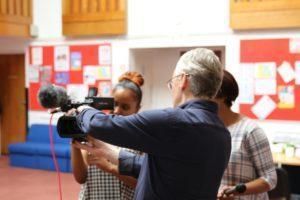Participatory Methods and Resources
 From our colleagues at Coventry U., Centre for agroecology, water and resilience. Useful if you are working on a Masters or PhD project and wanting to use participatory methods. Also for those supervising students who are incorporating participatory approaches.
From our colleagues at Coventry U., Centre for agroecology, water and resilience. Useful if you are working on a Masters or PhD project and wanting to use participatory methods. Also for those supervising students who are incorporating participatory approaches. Check out these dissertations and theses for examples of graduate-level participatory research and how these students wrote up their work.
The different structures, approaches and styles in these examples may help you in thinking through different ways to approach the write-up phase.
Examples of Dissertations Using Participatory Research:http://www.peoplesknowledge.org/resources/dissertations/
(You may send your examplesto Colin Anderson at Centre for Agroecology, Water and Resilience, Coventry University, www.peoplesknowledge.org)
(You may send your examplesto Colin Anderson at Centre for Agroecology, Water and Resilience, Coventry University, www.peoplesknowledge.org)
Also, a ‘curated resource’ list on participatory video (PV) including a selection of tools, guides and literature that we feel are helpful for understanding participatory video and especially for advancing its emancipatory potential. The list can be found here: http://www.peoplesknowledge.org/resources/read/pvlist/
Participatory Video (PV) is used by groups to explore an issue of mutual concern, to document the opinions and aspirations of those participating, to construct a representation of this process in the form of a film and to pursue social change through this process. As a method of inquiry, it resonates with the emancipatory and democratising character of Participatory Action Research (PAR), especially when it is employed in a way which acknowledges and aims to deal with power relations and inequalities (Kindon 2003). In some areas of international development work, PV is seen as a neutral catalyst for social change through awareness-raising and sharing knowledge. There is indeed a risk that PV can be instrumentalised and used as a mode of enrolling marginalised people into top-down research or development plans, limiting the agency of PV film making groups, and undermining the emancipatory potential of PV. Thus, as with other methods, PV demands a self-critical reflective process, especially when institutions are involved, in order to deliver on aims of emancipation and positive social transformation (Milne 2016, Shaw 2012). Click here for more details…
You are also invited to join the related Facebook group (https://www.facebook.com/groups/peoplesknowledge/) and to actively share any events, ideas or resources related to People’s Knowledge and participatory approaches to research-action-learning.
Latest posts by Hilary Brad (see all)
- Three stories we did not tell about NGO-Community Collaboration in Uganda - April 18, 2024
- Podcast on PAR Peacebuilding in Colombia - April 15, 2024
- Julian Hauer’s Workshop– thinking wider and deeper - April 15, 2024
